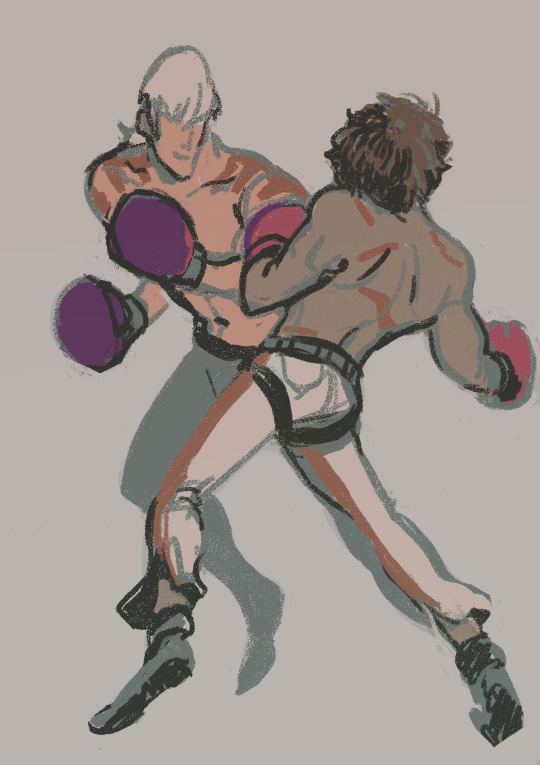#megalobox
Text
Sports series and their lessons
SLAM DUNK: Ball is life.
HAPPY!: Ball is life and sex workers are great babysitters.
PRINCE OF TENNIS: Ball is life but a big responsibility because you might accidentally cause a mass extinction event.
KUROKO NO BASUKE: Ball is life and fistbumps are dangerously powerful.
FREE!: Water in large quantities destroys lives and the battle between a well-done coming of age story and capitalism and fanservice will give a director no choice but to seek solace in emotional devastation and violent action scenes.
HAIKYUU: Ball is life and volleyball is made up.
REAL: Ball is life and legs are optional.
ROBOTXLASERBEAM: Ball is life and it's important to teach this lesson to robots before their uprising so we have common ground.
YURI ON ICE: Getting shitfaced to meet your idols will only benefit your personal and professional life.
ALL OUT!: Ball is life and if you embrace this you can overcome your physical insecurities.
SK8 THE INFINITY: You don't have to be the best at something if you're enjoying it with someone you love and if there had been skateboarding in England in the 1880s JoJo's Bizarre Adventure would have been much shorter.
OOKIKU FURIKABUTTE/BIG WINDUP: Ball is life and your pitcher's health is paramount because if he is injured you have to take him to the outfield and shoot him like a horse with a broken leg.
TEPPU: There is no point in sports if you don't draw blood and excessive Jean Claude van Damme movies will permanently alter your sexuality.
EYESHIELD 21: Ball is life and Satan rules.
MEGALOBOX: No matter how dystopian the future, people will always want to gamble on the outcome of two men punching each other.
HIKARU NO GO: Ghosts are real.
#serious lists about serious lessons#oofuri#ookiku furikabutte#big windup#megalobox#real#eyeshield 21#hikaru no go#yuri on ice#happy!#teppu#slam dunk#prince of tennis#kuroko no basuke#free!#all out!#robotxlaserbeam#sk8 the infinity#weeb shit#haikyuu
1K notes
·
View notes
Text

Oh Maria, come slowly
Come slowly to me
I've been waiting
Patient, patiently
I didn't care but now I can see
That there's a way out
That there's a way out
That there's a way out
That there's a way out
That there's a way out
"Go slowly", by Radiohead
____
Do NOT use, steal, reshare my stuff.
Don´t take it without my consent.
#megalobox#megalo box#nomad#ashita no joe#junk dog#gearless joe#boxing#underground#neon#grief#isolation#digital art#comic#web comic#Radiohead lyrics#jogh
250 notes
·
View notes
Text



Happy first Aromantic Visibility Day, people!!
My shop!! Emergency Commissions are open, pls commission me!! Pls don’t ignore my DNI! Reblogs are mandatory! I’ve been wanting to draw this for years
#Rolaplayart#Gearless Joe#aromantic#Aromantic Visibility Day#aro#megalobox#megalo box#Aro Pride#aromantic asexual#aromantic positivity#aromantic pride#aroace#nonbinary#transgender#maverique#Anime Fanart#Commissions Open#イラスト#apothisexual#apothiromantic
108 notes
·
View notes
Text

Theodor Bastard - Volch'ya Yagoda
#megalo box#megalobox#k:by fans#k:fanart#k:offerings#k:s2#k:Joe (S2)#k:black dog#another one after the first episode#i still think it was one of the best episodes of the season#the rawness of it all was fantastic
78 notes
·
View notes
Text
Do You Know This Anime?

14 notes
·
View notes
Text
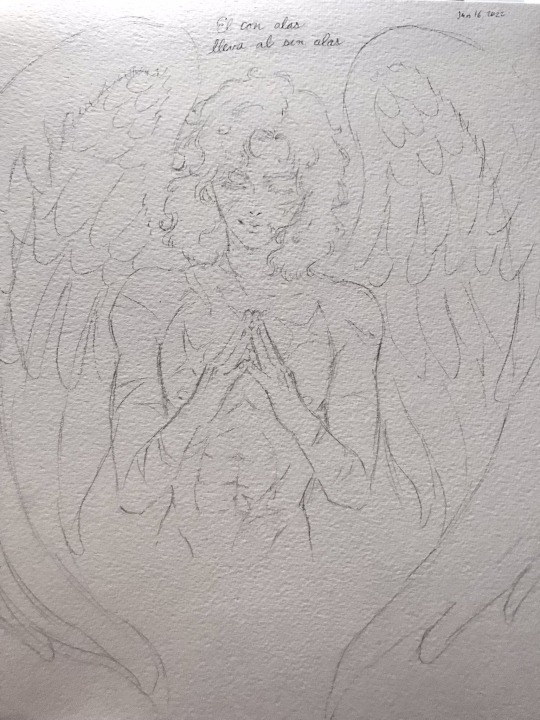
Angel Joe :)
24 notes
·
View notes
Text
God, the parallel between C4-621 and Joe from Megalobox just hit me like a brick.
Walter's Hound and Nanba's Junk Dog are both strays who get picked up solely to fight. They're both underdogs who end up freeing themselves from the leash.
621 can eventually reverse their augments and fly high as Raven whilst Junk Dog sheds his gear and name and becomes Gearless Joe, the best version of himself.
Does anyone know how to make a boxing-orientated AC? I think I need to make a Junk Dog mech.
#For anyone who hasn't seen it Megalobox is one of the best sports/fighting animes I've ever watched I recommend it so much#There's only 13 episodes in each series its super easy to get through and such a good story#armored core 6#c4 621#Raven#Megalobox#Gearless joe#junk dog#Gansaku Nanba#Handler Walter
21 notes
·
View notes
Text
Best Underrated Anime Group F Round 3: #F4 vs #F7
#F4: Young boxer in futuristic Japan fights in tournament
#F7: Transmigrator heals a reincarnation revenge story
Details and poll under the cut!

#F4: Megalo Box
youtube
Summary:
Follows the story of a young man that only goes by his ring name “Junk Dog”, set in the late 21st century. People live in a large metropolis, those without citizenship forced in slums called the Restricted Area. Junk Dog fights in fixed matches in the Restricted Area in a sport called Megalo Box, which is boxing augmented by metal exoskeletons.
One day, Junk Dog almost crashes into the CEO of the Shirato Company on his motorcycle, and he tries to pick a fight with her guard, Yuri. Yuri ends up fighting Junk Dog in a match, beating him and challenging him to fight him in a tournament called Megalonia. Forging an ID and taking the name Joe with help from his coach, the young fighter only has 3 months to win enough matches to rank high enough to get into the tournament and face Yuri. Not just for his pride, but also because of threats from the mafia, who wants money from Joe and his coach that they don’t have.
Propaganda:
Megalo Box is a series that got some recognition during the Crunchyroll Awards. It even aired on Adult swim’s late night anime block, even gaining a second season. But it seems like after the initial season, all interest of the show evaporated. It’s rarely talked about in fandom spaces or in anime video essays.
Which is a shame! It's a solid watch. The music is stellar. The characters are enjoyable, even if the plot of the main character Joe being a massive underdog that claws his way through a boxing tournament is a little predictable. But to be fair, this show was created to commemorate the 50th anniversary of the boxing manga Ashita no Joe.
Still, the anime keeps things fresh. It has added political commentary about class and race dynamics. Joe is brown-skinned, looks mixed, and is an undocumented citizen in the city he lives in. He has to fight in illegal fixed Megalo Box matches in the slums in order to make ends meet. Even that provides little protection, as he and his coach Ganbu get threatened by the mob for more money that they can’t produce. It also touches upon how children are abandoned and abused by the system with Sachio.
Joe is the ultimate underdog story. He ends up going by “Gearless Joe” because he fights his matches without wearing any Gear—aka the metal exoskeletons use in Megalo Box. He’s essentially boxing old-school style against others an unfair advantage with tools that augment their punches and movements. Joe did this in the first place because he was too poor to buy a new Gear, his old one falling apart, so he felt he was better off training and using his natural body in matches.
The second season also explores Joe's struggles with depression and drug addiction as he trains another Megalo Boxer, which is interesting and adds another layer to him.
Plus, the show also has racial diversity in the side characters. The English dub cast voice actors of the same ethnicities for Pepe, Chief, and Maria. Also, Kaiji Tang voices Joe, the lead.
Trigger Warnings: Child Abuse, Graphic Depictions of Cruelty/Violence/Gore.
The anime is about boxing, so characters get beaten up quite a bit (even in fantastical ways). However, there’s also some other violence threats (like Joe’s coach Nanbu getting his eye cut and threatened to earn money by the mafia). Also, a kid named Sachio joins the group to help Joe and gets beaten by thugs and threatened a few times through the series.

#F7: There’s a Pit in my Senior Martial Brother’s Brain (Wo Jia Dashixiong Naozi You Keng)
Official English title: What’s Wrong With My Big Brother
Alt Title: My Dashixiong Has a Pit in His Brain
youtube
Summary:
Dongfang Xianyun transmigrates as the eldest disciple of the Care-free sect. But the only thing that goes through his mind is to make sure he doesn’t end up dying by the hands of the “main character.” He believes he’s just a side character. He just wants to relax and survive all the mayhem surrounding him while dealing with one of his jealous sect teammates, who grew corrupted in the past life.
Propaganda:
This series is kind of insane but also just a lot of fun! The thing is, the shidi (junior martial sect brother), Yin Feixing, felt betrayed by his dashixiong (eldest senior sect brother), Dongfang Xianyun, after he was seemingly rejected for ending up studying the demonic arts. After he dies, he decides to take revenge in the next life, and this is where our story starts off…
The only problem is his dashixiong has been replaced by a transmigrator. And our new Dongfang Xianyun is not as cold or uptight as the past dashixiong (but as the story unravels, was he even that bad?); rather, this version is silly and goofy and fun. And because he believes wholeheartedly that Yin Feixing is the protagonist, he doesn’t act the way a dashixiong is expected to—but it’s in this silliness that one can find sincerity…
So as Yin Feixing exacts his revenge, turning Dongfang Xianyun into a demonic arts practitioner, Dongfang Xianyun’s new soul means he won’t follow the same path as Yin Feixing. Rather than fall to ruins like Yin Feixing, his empathy and creativity means he challenges this entire world by making his fellow demonic practitioners into law-abiding heroes, even as people hate him for the demonic arts. So as multiple plots unfurl, we get a pretty emotional, thematically interesting story, even amidst all the (very funny) crazy comedy, and a clever parody of xianxia* and other transmigration stories. 😆
(*Xianxia (仙侠 xiānxiá) – literally means “Immortal Heroes”. Fictional stories featuring magic, demons, ghosts, immortals, and a great deal of Chinese folklore/mythology. Protagonists (usually) attempt to cultivate to Immortality, seeking eternal life and the pinnacle of strength. Heavily inspired by Daoism. Source)
Oh, and Gong Changsheng is best puppy! He’s such a good sunflower boy with the biggest crush on Dongfang Xianyun, and I love them so much. I think lots of others will love them too if they gave this series a chance. 🥺
The slightly evolving names for each season are fun too:
S1: 我家大师兄脑子有坑 (My Dashixiong Has a Pit in His Brain (aka “he’s really dumb/ridiculous”))
S2: 我家大师兄是个反派 (My Dashixiong Is a Villain)
S3: 我家大师兄有点靠谱 (My Dashixiong Is a Bit Reliable)
(Plus, besides the original manhua, there’s a fun chibi OVA where the cast are like actors!)
Trigger Warnings: Graphic Depictions of Cruelty/Violence/Gore. The donghua isn’t as intense as the manhua, but there is one character who flirts in a somewhat creepy manner.

When reblogging and adding your own propaganda, please tag me @best-underrated-anime so that I’ll be sure to see it.
If you want to criticize one of the shows above to give the one you’re rooting for an advantage, then do so constructively. I do not tolerate groundless hate or slander on this blog. If I catch you doing such a thing in the notes, be it in the tags or reblogs, I will block you.

Know one of the shows above and not satisfied with how it’s presented in this tournament? Just fill up this form, where you can submit revisions for taglines, propaganda, trigger warnings, and/or video.
#anime#donghua#best underrated anime#polls#poll tournament#tournament#anime tournament#animation#group stage#group stage round 3#tournament polls#group f#megalobox#megalo box#wo jia dashixiong naozi you keng#what's wrong with my big brother#there's a pit in my senior martial brother's brain#my dashixiong has a pit in his brain
12 notes
·
View notes
Text
I love boxing anime/manga where the protagonist and his rival are shipped by the fandom. (especially if they knew each other beforehand or in childhood and started beefing with each other for some reason) Like there’s something so inherently romantic about beating the absolute shit out of somebody. Like just. Absolutely knocking them the fuck out
#anime#manga#megalobox#megalo box#yes I’m tagging this with megalobox because it’s the biggest example of this I can think of
72 notes
·
View notes
Text
The Curious Case of Megalobox and Translation as a Form of Metacommentary
Pardon me for I must speak about the boxing show.
***Vague spoilers for Megalobox Season 1***
Background
Megalobox is a 2018 sports anime set in a futuristic Japan that is characterized by wealth-disparity and illegal immigration. The story follows Joe “Junk Dog,” a boxer who partakes in underground, rigged fights orchestrated by the mafia tycoon Fujimaki. Despite his talent, Joe’s status as an illegal alien ensures that he is doomed to throwing matches for income.
Joe’s literary foil is the champion boxer Yuri. Possessing a much higher status than Joe, Yuri is the main fighter for the Shirato Group, a tech company specializing in assistive gear for megalo-boxing matches. His passion for boxing has ultimately been stifled by the economic aspirations of the Shirato Group’s CEO, Yukiko Shirato. In a bid to display their state-of-the-art boxing gear to military investors, the Shirato Group hosts a megalo-boxing tournament. This decision sets the course for Joe and Yuri’s inevitable collision.
Themes
Megalobox explores a variety of concepts such as poverty, addiction, classism, and family. At its crux, the first season emphasizes that greed is the antithesis of passion and that personal autonomy is necessary to achieve a life well-lived.
Audience
I was unable to find any demographic information for Megalobox’s audience. The creative team elected to use line art reminiscent of 90s hand-drawn animation, and the rating is 14 and up. From this, it is clear the intended audience was meant to be young adults and older. Additionally, I think it’s safe to say given the contents of the show that it is intended to appeal to male viewers.
Thesis
Translational variances between the Japanese dub of Megalobox and the English sub and dub versions present different interpretations of the show’s core messages. In the English translation, gender is injected into the show’s text in ways absent in the original Japanese.
Discussion
By and large, the translation team for Megalobox did a stellar job keeping true to the original intention of the Japanese dialogue. The English dub mirrors the English subtitles very closely, and I think the voice acting team did a very good job at delivering these lines. In fact, Megalobox is one of the few anime that I chose to watch in English dub instead of with subtitles, which has culminated in my current epiphany.
When watching, I couldn’t help noting some of the moments when characters would discuss “men” as a state of being. In these scenes, the word “men” was used in lieu of “human” to discuss philosophical concepts. This tendency tinted my understanding of Megalobox. I was curious if this gendered interpretation was inherent to the original Japanese as well or if this machismo patina was a result of translational bias. After performing brief comparisons of some English and Japanese scenes, I discovered it was the latter.
There are a few moments in the show where non-gendered phrases are translated as male. For instance, in episode 12, Yuri and Yukiko are discussing the irrationality of Yuri’s desire to fight Joe. In the English subtitles, Yuri explains his reasoning with the following:
“The man who taught me Megalo-boxing told me something. ‘If you’re lucky enough to run into a fighter in your generation who you want to win against from the bottom of your heart, consider yourself blessed. If you ever find someone like that, never let him out of your sight.'"
The tricky thing with translating sentences like the ones above is that Japanese often doesn’t use pronouns. There’s no need to use them because grammatical subjects aren’t required to form a complete sentence. As such, when translating Japanese to English, a pronoun often must be inferred for the translation to be effective. Translators are thus left to fill in the blanks of what the English translation should be. This freedom leads to some interesting results, like in Megalobox. For example, the above quote doesn’t actually use any gendered language at all in the original Japanese.
“The person [人 hito] who taught me Megalo-boxing told me something. ‘If, in your generation, you meet a fighter who you want to win against from the bottom of your heart, that is a blessing. If you ever meet a person like that, never take your eyes off of [them].'”
The “man” and “him” in the translation are absent from the actual Japanese. This isn’t a huge deal, especially because we see that Yuri’s trainer was a man and, Yuri being a male Megaloboxer, his opponent being male is sort of implied. In the dub, there is the additional challenge of matching the mouth movements to the VA’s lines. Again, I don’t take issue with the above English translation since the gender is implied through context. Some other translations, however, altered the text in ways that fit the original message of Megalobox into a gendered frame.
Such alterations appear in two conversations, once in episode 6 between Aragaki and Nanbu and once in episode 13 between Yuri and Joe.
(1) In the conversation between Aragaki and Nanbu, the two are discussing the finale of Aragaki’s career and his feelings surrounding it. Aragaki discloses a conversation he had with Joe:

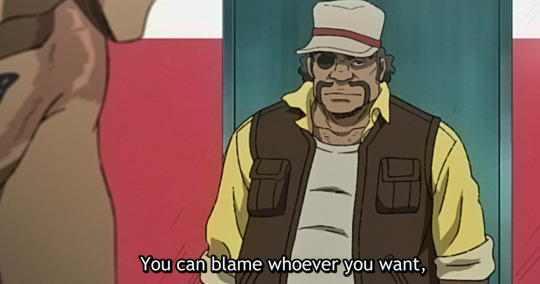
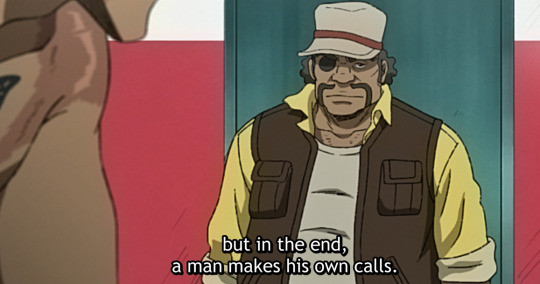
However, the closer translation is something like, “Joe said something to me: ‘You can blame whoever, but the decision to make the call is up to you.’” The Japanese word used here isn’t “man” or even “human.” The original Japanese uses the word 手前 (temei), which is a derogatory way to say “you.” Aragaki is literally relaying the words that Joe said verbatim. In the English, the translation is generalized to humanity in general, encapsulated by the gendered term “man.” As such, the moral of Joe’s Japanese statement splits from its insular roots (“You have to make your own call”) to instead reflect a broader worldview (“A man makes his own calls”).
(2) The second time this alteration appears is during a brief internal monologue of Yuri during his fight with Joe. The main statement of interest is this one:
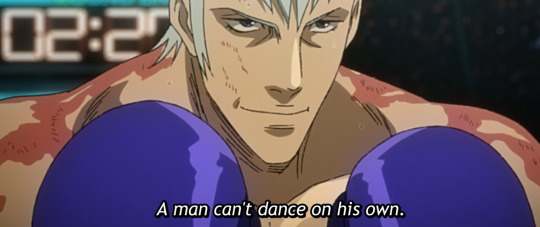
The closer translation, however, is, “I can’t dance on my own.” The Japanese word used here is 俺 (ore), a gruff, masculine way to say “I” instead of the “a man” used in the English dub and subtitles. Given this, what the spoken Japanese accomplishes is completely different in tone and message from the English subtitles and dub. In the Japanese, Yuri is expressing a thought that pertains only to himself and Joe; in contrast, the English translation poses this moment as if Yuri is pontificating about the nature of man and man’s dependence upon competition to achieve new heights. While both the original and translation are not entirely divorced from the core concept of Megalobox (i.e., passion makes life worthwhile), the English translation provides a societal commentary on the nature of man that is not present in the original Japanese.
Closing Thoughts
I hesitate to describe this type of translation as “dangerous." It is completely fine to have media that explores what it means to be a man in the same ways it is fine to have media that explores what it means to be a woman or to be someone of any other gender.
That being said, at its core, Megalobox discusses the human condition and the necessity of dreams—fueled through personal autonomy—to sustain meaning in life. This moral is by no means intended to be gendered in the original Japanese. In the conversation between Aragaki and Nanbu, for example, the Japanese assertion that people have to make their own choices can just as easily apply to anyone of any gender, not just men. The English takes this message and, perhaps unintentionally, restricts it to one gender. I would therefore assert that the worst outcome of gendering the theme of Megalobox is that it is disingenuous to the original material.
Fascinatingly, I think my own months-long obsession with this element of Megalobox stemmed from the fact the English highlighted that I was not the intended audience. I kept thinking while watching the dub that I understood what the text was trying to communicate to me, that the philosophical conflict was something inspiring and applicable to my own life, only to run into the brick wall of, “This media is not meant for you.”
If anything, it is very much interesting how translational decisions can have such a profound effect on a show’s delivery.
81 notes
·
View notes
Text
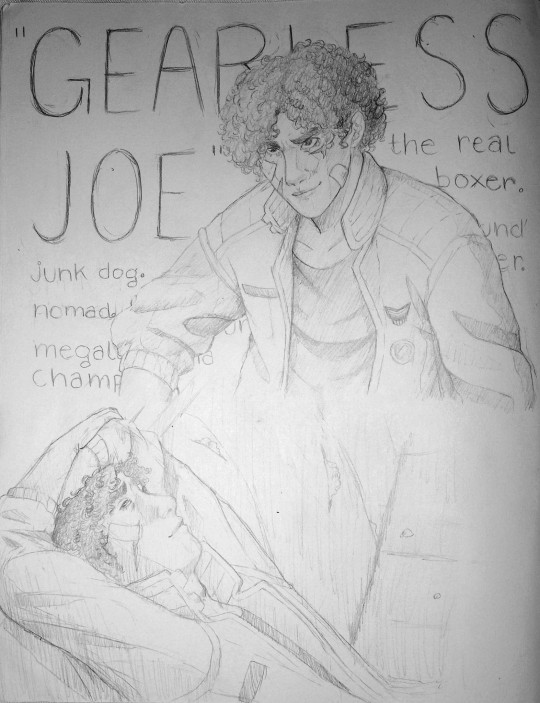
some sketches of Joe for the Megalobox fandom xx
33 notes
·
View notes
Text
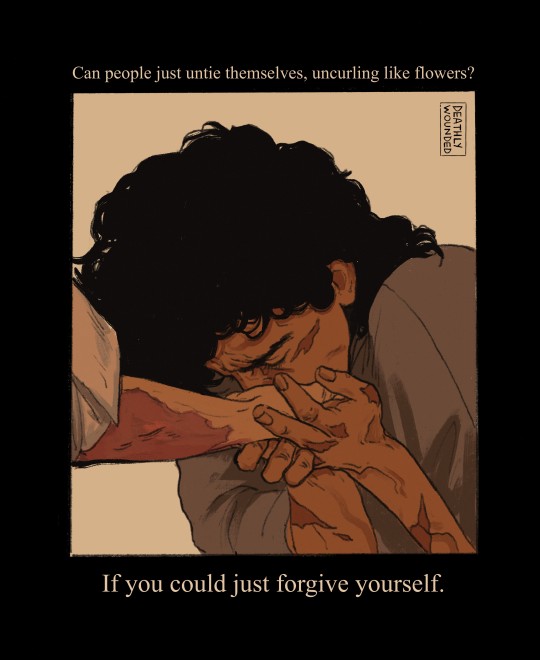
"The monument of a memory
You tear it down in your head
Don't make the mountain your enemy
Get out, get up there instead
You saw the stars out in front of you
Too tempting not to touch
But even though it shocked you
Something's electric in your blood
Can people just untie themselves?
Uncurling like flowers
If you could just forgive yourself
But still you stumble,
your feet give way
Outside the world seems a violent place
But you had to have him,
and so you did
Some things you let go in order to live
While all around you
the buildings sway
Sing it out loud
"Who made us this way?"
I know you're bleeding,
but you'll be okay
Hold on to your heart,
you'll keep it safe
Hold on to your heart,
don't give it away"
Various Storms & Saints
By the one and only, Florence and the Machine ♥️🗡🥀
_
Do NOT use my work without consent.
Just DON`T.
#Megalobox#Megalo box#Junk Dog#Nomad#anime#ashita no joe#Gearless Joe#Yuri#Yujoe#angst#grieff#vulnerability#florence and the machine#f+tm#quotes#jogh
158 notes
·
View notes
Text
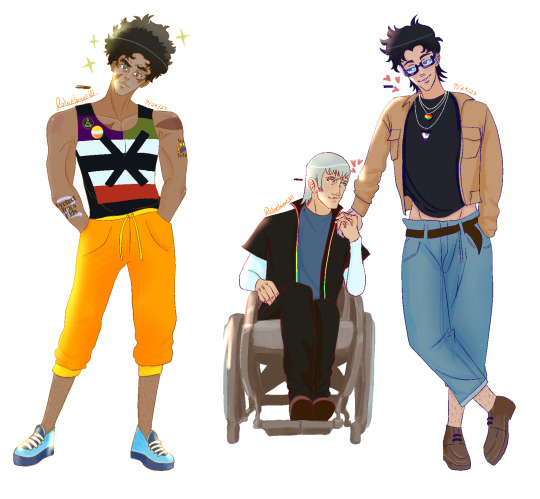

#Rolaplayart#Megalobox#Gearless Joe#Yukio#Mb Yuri#Mikio Shirato#Megalo Box#Aroace#Apothisexual#Apothiromantic#Trans#Maverique#Nonbinary#Gay#Asexual#aromantic#Disabled Pride#Artist ON Tumblr#Digital Art#Illustration
17 notes
·
View notes
Text
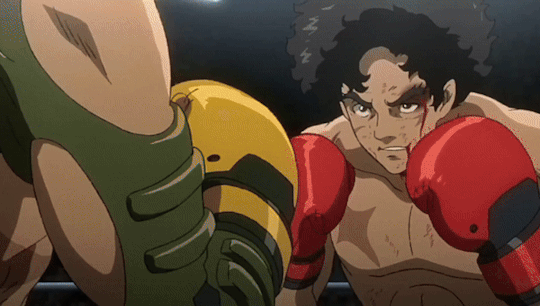
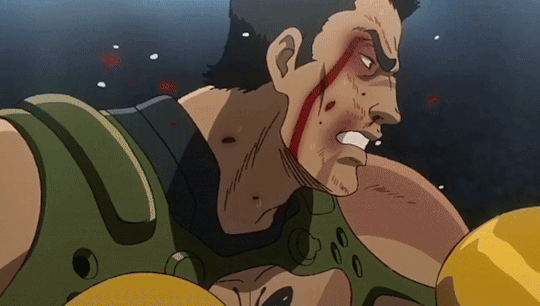
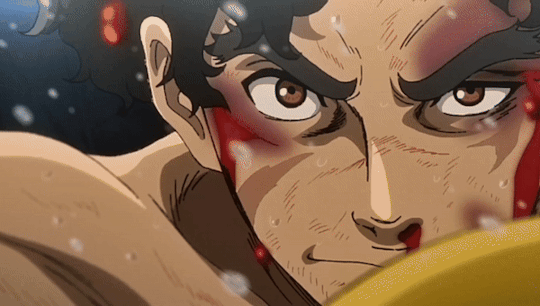

Megalobox [Season 1 episode 6]
10 notes
·
View notes
Text
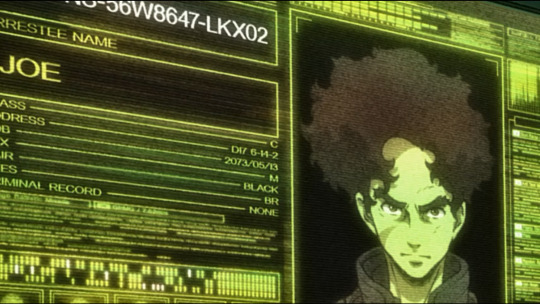
They don't make graves for stray dogs...
44 notes
·
View notes

